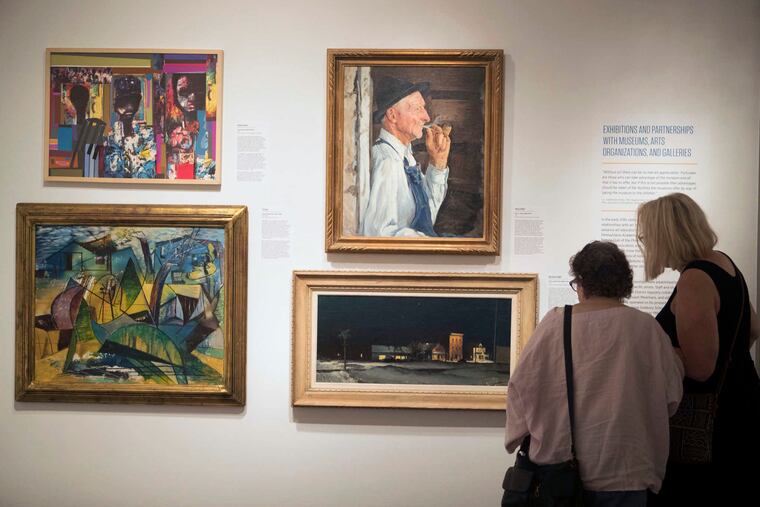Removed in secret, hidden for years, Philly schools' art collection belongs in the public eye, officials now say
The school board has pledged, in a new policy, to hold onto the vast art collection permanently and aims to get it in front of students. Some works could return to school walls, and others might eventually show up in traveling exhibits.

Hidden away for more than a decade, the vast collection of artwork that once hung on public school walls across Philadelphia will return to the public eye — in school halls or traveling exhibits — as soon as practical, the Philadelphia Board of Education recently promised.
The collection of 1,200 paintings, sculptures, murals, tapestries, and other pieces once optimistically estimated to be worth $30 million was abruptly removed from schools in 2003 and 2004, when officials said the works were too valuable to hang unsecured.
For years, the Philadelphia School District refused to say much about the works it yanked from school buildings, forcing advocates to go to court to find out exactly what was held in a location it refused to disclose. At different times, the powers that be contemplated selling all or part of the collection when financial crisis hit.
That option is now officially off the table.
The school board has pledged, in a new policy, to hold on to the artwork permanently and aims to get it in front of students. Some works could return to school walls if arrangements can be made to display the work safely and under proper conditions, and others might eventually show up in traveling exhibits. Annual reports accounting for the art inventory will be made public, and a committee will work to establish a charitable trust responsible for the preservation, management, and display of the collection.
Board member Christopher McGinley has been concerned about the fate of the art since it was “removed and mismanaged” from schools. The removal, he said, deflated many schools.
“Artwork that was bought for schools was intended to be seen by students,” said McGinley. The collection, now valued at about $2 million, “may not have great monetary value, but it has great value to the community," he said.
(The $30 million figure was cited during the administration of former schools chief Paul Vallas; officials now say that after evaluation by art experts, the real cash value is much lower.)
The art includes works by Thomas Eakins, N.C. Wyeth, noted African American artists Henry Ossawa Tanner and Dox Thrash, and late 19th- and early 20th-century Pennsylvania impressionists Walter Baum and Edward Redfield. At the time they were removed by the district, some works were proudly displayed with gallery lighting and signs; other pieces were found stuffed in closets or boiler rooms.
Officials had them removed from buildings, sometimes under cover of darkness, and said at the time that they would catalog and restore the art, if necessary, before figuring out how best to display the pieces.
The collection remained concealed, however, save for 15 of the works briefly exhibited at the Michener Museum in Bucks County in 2017. A group of advocates, led by former Philadelphia educators, spent years trying to figure out exactly what was in storage and how to get it back in front of children.
Other districts have wrestled with the same problem; some have formed nonprofits to handle their art, and others have partnered with museums to show it.
Arlene Holtz, retired principal of Woodrow Wilson Middle School, which once had 72 significant oil paintings carefully framed and hung in its hallways, cheered when the board formalized its new policy in December.
When the district removed the works from Wilson and other schools, “we lost not just a treasure, we lost an idea — that beautiful artwork belongs not just to the rich, it belongs to all our children regardless of where they live,” Holtz said.
Wilson’s art collection was amassed by Charles Dudley, the school’s first principal, who believed that exposing children to art would inspire good behavior and morals and make the school beautiful. He created a museum-like environment, directly appealing to such artists as Baum to sell him works at a good price. Dudley raised funds by charging a nickel to show visitors the collection.
Another school, Laura Wheeler Waring Elementary, in Fairmount, used to display a work by Waring herself, the African American artist and teacher for whom the school is named.
“These collections are inexhaustible and are to be preserved and used to benefit the students and citizens of Philadelphia,” the board policy declared. “The School District of Philadelphia’s collections of art shall be held for educational purposes, research, or public exhibition for the community to enjoy or to generate funds for their preservation and not for financial gain.”
The new board policy is a victory, but a first step, said Holtz. The art has been cataloged and accounted for, but it remains in storage.
While principals will now be able to ask for the return of artwork to their schools, the reality is that most schools are unable to guarantee that valuable artwork can be kept safe and in proper conditions. And few current school staff have memories of what art used to line their walls, though the district does have records of where each piece came from.
Traveling exhibits or public shows at the district’s central headquarters on North Broad Street are a possibility, McGinley said; so is an online teaching tool or other ways to make the art and its history part of the School District’s curriculum.
“There is an information-sharing responsibility on the part of the district,” said McGinley. “We have the ability and the responsibility to have periodic showings of the work.”